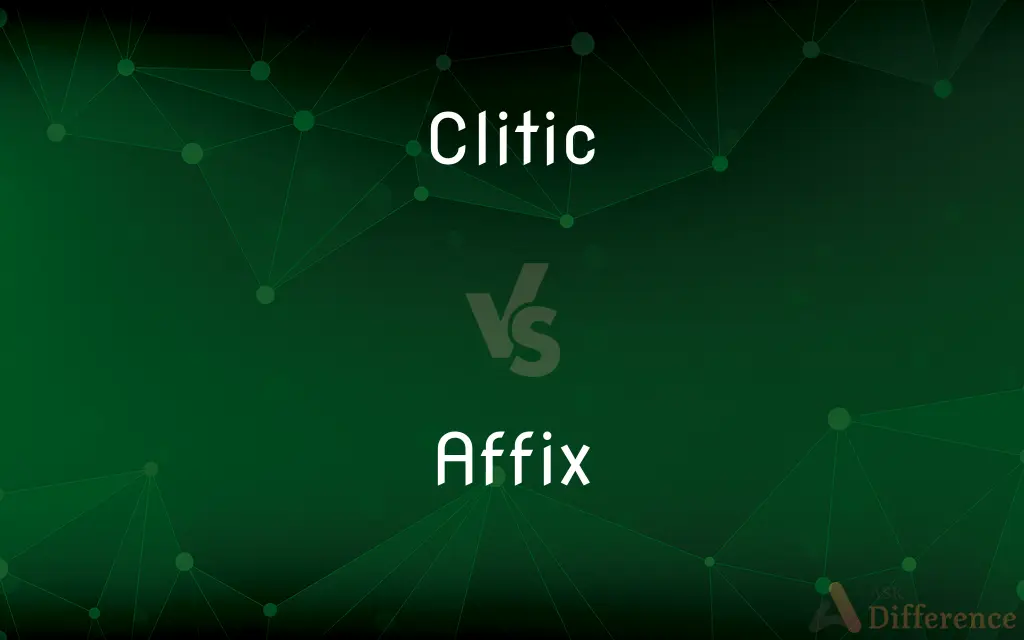Clitic vs. Affix — What's the Difference?
By Tayyaba Rehman & Urooj Arif — Updated on March 10, 2024
Clitics are linguistic elements that attach to words to convey grammatical meaning but are not considered affixes. Affixes are bound morphemes that modify a word's meaning or grammatical function.

Difference Between Clitic and Affix
Table of Contents
ADVERTISEMENT
Key Differences
Clitics are linguistic units that, despite having syntactic characteristics similar to words, lack the phonological independence of words and must attach to a host word to convey meaning. They play a grammatical role, such as indicating possession or contractions in English (e.g., the 's in "the dog's bone" or 've in "I've"). Affixes, on the other hand, are bound morphemes—prefixes, suffixes, infixes, or circumfixes—that attach to a stem or root word to alter its meaning or create a new word. They are integral parts of the word formation process in languages.
While clitics can be attached to the words they modify in a somewhat flexible manner and often depend on sentence structure, affixes have a fixed position relative to the root or stem word they modify. For example, suffixes always follow the root word they modify. Clitics, however, might attach to the beginning or end of phrases depending on the rules of the language and the specific clitic.
An important distinction is that clitics do not change the lexical category or fundamental meaning of their host word but rather add additional grammatical information. Affixes, particularly derivational affixes, can change the grammatical category of the words they attach to (e.g., the addition of -ness to "happy" to form "happiness" changes an adjective into a noun).
Clitics are often spoken elements that become evident in spoken language use, demonstrating their dependency on host words for pronunciation. In contrast, affixes are recognized as part of the standard morphological structure of words, evident in both spoken and written language.
The choice between identifying an element as a clitic or an affix can depend on the linguistic analysis and the language's characteristics. Some elements might be considered clitics in one language and affixes in another, reflecting the complexity of language structure and the roles these elements play in different linguistic systems.
ADVERTISEMENT
Comparison Chart
Nature
Syntactic unit attached to a host word
Bound morpheme attached to a word's stem
Phonological Independence
Lacks independence, requires a host
Integrated into the word, not independent
Position
Flexible, depending on syntax
Fixed (prefix, suffix, infix, circumfix)
Role
Adds grammatical information
Modifies meaning or grammatical function
Effect on Host
Does not change the host's lexical category
Can change the lexical category
Examples
's (possession), 've (have)
-ness (happiness), re- (rewrite)
Compare with Definitions
Clitic
A linguistic element that attaches to a host word for grammatical context.
In I'm, 'm is a clitic denoting am.
Affix
Used in both spoken and written language, recognized in linguistic analysis.
The prefix pre- in preheat indicates an action before another.
Clitic
Provides grammatical rather than lexical information.
Can't uses the clitic 't to indicate negation.
Affix
A morpheme that attaches to a stem to form a new word or alter its meaning.
The prefix un- in unhappy negates the meaning of the adjective.
Clitic
Flexible in attachment, based on syntactic structures.
The possessive 's can attach to nouns or noun phrases.
Affix
Integral to the word formation and morphological structure.
Kindness involves the suffix -ness to form a noun from an adjective.
Clitic
Dependent on a host for pronunciation, lacking phonological independence.
The clitic 'll in she'll attaches to pronouns.
Affix
Can change the grammatical category of words.
Adding -ly to quick forms the adverb quickly.
Clitic
Often used in informal spoken language for contractions.
In we're, 're is a clitic meaning are.
Affix
Can be a prefix, suffix, infix, or circumfix, with a fixed position.
The suffix -able in readable forms an adjective.
Clitic
In morphology and syntax, a clitic (, backformed from Greek ἐγκλιτικός enklitikós "leaning" or "enclitic") is a morpheme that has syntactic characteristics of a word, but depends phonologically on another word or phrase. In this sense, it is syntactically independent but phonologically dependent—always attached to a host.
Affix
In linguistics, an affix is a morpheme that is attached to a word stem to form a new word or word form. Affixes may be derivational, like English -ness and pre-, or inflectional, like English plural -s and past tense -ed.
Clitic
An unstressed word that normally occurs only in combination with another word, for example 'm in I'm.
Affix
Stick, attach, or fasten (something) to something else
Panels to which he affixes copies of fine old prints
Clitic
An unstressed word, typically a function word, that is incapable of standing on its own and attaches in pronunciation to a stressed word, with which it forms a single accentual unit. Examples of clitics are the pronoun 'em in I see 'em and the definite article in French l'arme, "the arm."
Affix
An addition to the base form or stem of a word in order to modify its meaning or create a new word.
Clitic
Of or relating to a clitic or clisis.
Affix
To secure to something; attach
Affix a label to a package.
Clitic
(linguistics) A morpheme that functions like a word, but never appears as an independent word, instead being always attached to a following or preceding word (or, in some cases, within a surrounding word).
Affix
To impute; attribute
Affix blame to him.
Affix
To place at the end; append
Affix a postscript to a letter.
Affix
(Linguistics) To add as an affix.
Affix
Something that is attached, joined, or added; an appendage or addition.
Affix
(Linguistics) A word element, such as a prefix or suffix, that can only occur attached to a base, stem, or root.
Affix
That which is affixed; an appendage.
Affix
(linguistic morphology) A bound morpheme added to the word’s stem's end.
Affix
A bound morpheme added to a word’s stem; a prefix, suffix, etc.
Affix
(mathematics) The complex number associated with the point in the Gauss plane with coordinates .
Affix
(decorative art) Any small feature, as a figure, a flower, or the like, added for ornament to a vessel or other utensil, to an architectural feature.
Affix
(transitive) To attach.
To affix a stigma to a person
To affix ridicule or blame to somebody
Affix
(transitive) To subjoin, annex, or add at the close or end; to append to.
To affix a syllable to a word
To affix a seal to an instrument
To affix one's name to a writing
Affix
(transitive) To fix or fasten figuratively; with on or upon.
Eyes affixed upon the ground
Affix
To subjoin, annex, or add at the close or end; to append to; to fix to any part of; as, to affix a syllable to a word; to affix a seal to an instrument; to affix one's name to a writing.
Affix
To fix or fasten in any way; to attach physically.
Should they [caterpillars] affix them to the leaves of a plant improper for their food.
Affix
To attach, unite, or connect with; as, names affixed to ideas, or ideas affixed to things; to affix a stigma to a person; to affix ridicule or blame to any one.
Affix
To fix or fasten figuratively; - with on or upon; as, eyes affixed upon the ground.
Affix
That which is affixed; an appendage; esp. one or more letters or syllables added at the end of a word; a suffix; a postfix.
Affix
A linguistic element added to a word to produce an inflected or derived form
Affix
Attach to;
Affix the seal here
Affix
Add to the very end;
He appended a glossary to his novel where he used an invented language
Affix
Attach or become attached to a stem word;
Grammatical morphemes afix to the stem
Common Curiosities
How does an affix differ from a clitic?
An affix is a bound morpheme that modifies the meaning or grammatical function of a word, whereas a clitic adds grammatical information without altering the word's lexical category.
Can a word have both clitics and affixes?
Yes, a word can have both clitics and affixes, each serving different roles in grammatical structure and meaning alteration.
What defines a clitic?
A clitic is defined as a linguistic element that attaches to a host word for grammatical context but lacks phonological independence.
How are clitics identified in written language?
In written language, clitics are often identified by apostrophes or hyphens indicating their attachment to host words.
What is the significance of clitics in language?
Clitics play a crucial role in conveying grammatical relationships and structures in sentences, adding nuances to spoken and written language.
How do affixes change words?
Affixes can change the meaning, grammatical function, or lexical category of words by attaching to their stem or root.
Are clitics considered part of a word?
Clitics are considered syntactically separate from the host word, despite being phonologically dependent on it.
Do all languages use clitics and affixes in the same way?
The use and function of clitics and affixes vary significantly across languages, reflecting the diversity of linguistic structures and grammatical systems.
What role do affixes play in word formation?
Affixes are central to word formation, enabling the creation of new words and the modification of existing ones within a language.
Can the classification of an element as a clitic or affix change?
Yes, linguistic analysis and changes in language use over time can lead to reclassification of certain elements between clitics and affixes.
Share Your Discovery

Previous Comparison
Drily vs. Dryly
Next Comparison
Cringy vs. CringeworthyAuthor Spotlight
Written by
Tayyaba RehmanTayyaba Rehman is a distinguished writer, currently serving as a primary contributor to askdifference.com. As a researcher in semantics and etymology, Tayyaba's passion for the complexity of languages and their distinctions has found a perfect home on the platform. Tayyaba delves into the intricacies of language, distinguishing between commonly confused words and phrases, thereby providing clarity for readers worldwide.
Co-written by
Urooj ArifUrooj is a skilled content writer at Ask Difference, known for her exceptional ability to simplify complex topics into engaging and informative content. With a passion for research and a flair for clear, concise writing, she consistently delivers articles that resonate with our diverse audience.














































